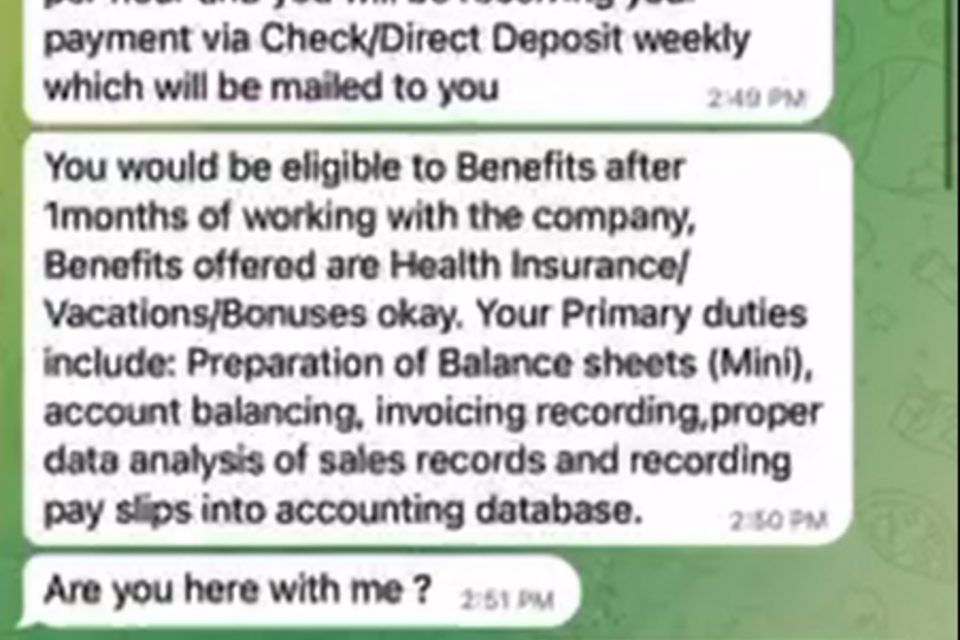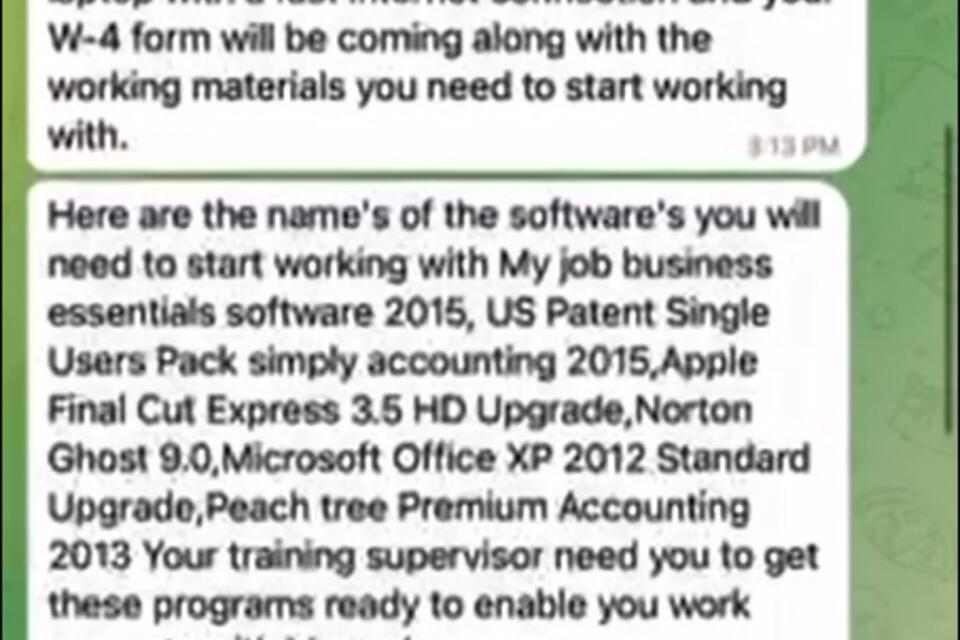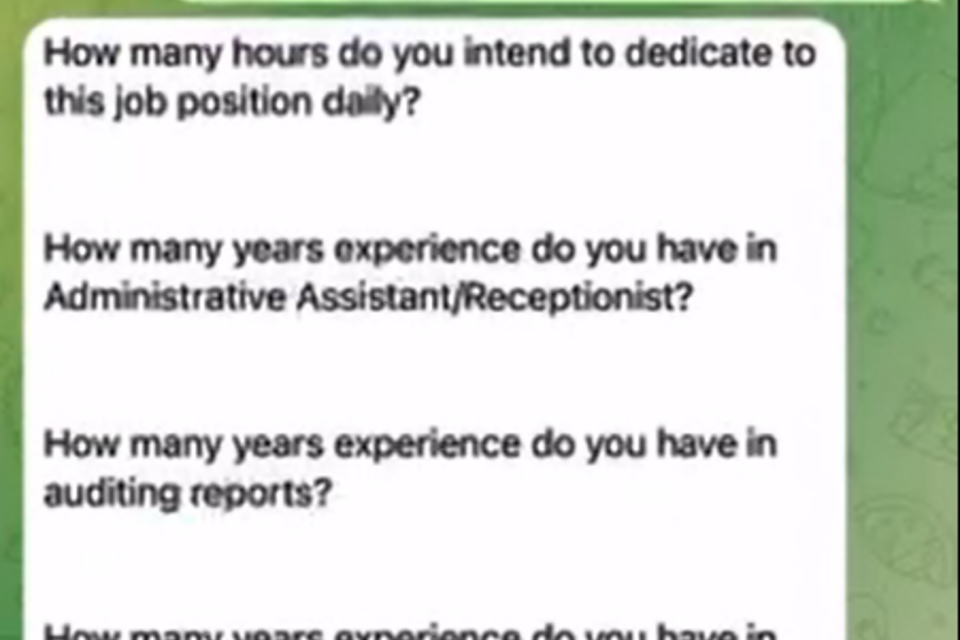Types of Job Scams
Employment scammers will try to take your money by offering a job that doesn't actually exist or pressuring you to spend money before potentially receiving a paycheck. Below are some common types of job scams.
-
Work From Home Scams
Working remotely has become very popular in the last few years. Job scammers post job listings that promise the potential to make thousands of dollars per month working from home with little effort. They advertise that you can set your own schedule, work for just a few hours a day, or start your own business in a few days.
Unfortunately, their promises are too good to be true and often involve fake check scams, reshipping or reselling scams, or pyramid marketing schemes. Furthermore, these jobs usually require you to buy a "starter kit" that costs hundreds or thousands of dollars, or to pay for training or certifications that have no meaning outside of the company. Some craft or product assembly jobs require you to purchase all the supplies from the company but then don't pay you enough to recover those costs.
Spherion will never ask you to pay money to become an employee. We typically advertise a set schedule for each role, and we do not charge for upskilling or training that leads to certification.
-
Mystery Shopper Scams
While some retailers employ legitimate mystery shoppers to evaluate and improve their customer experience, mystery shopping becomes employment fraud when the "employer" asks you to purchase goods or services with your own money. Or, if they ask you to cash a check and then wire or deposit the money to a third party. This is money laundering and/or wire fraud, and when the banks uncover it weeks later, you will be responsible for paying back the missing money.
Spherion never asks its employees to pay money upfront for goods, services, training, certifications, equipment or paperwork.
-
Guaranteed Employment or Income Scams
Some job scammers promise you a guaranteed income if you first purchase a business plan, start-up materials, software or computer equipment, or other items. Other scammers will promise a job if you first pay to appear in a job directory. Both of these examples are scams, and you will only lose money if you agree to their terms. There is no guaranteed job or income behind these scams. Paying to appear in a directory either does not happen, or you appear in a directory that does not lead to any jobs from any legitimate company.
Spherion does not require you to pay money for our placement services, training or equipment as part of our application process. Our clients do not charge potential employees in order to become employed. We will never ask for money or try to sell you goods or services as a condition of earning a paycheck or getting a position.
-
Visa/Work Permit Scams
If you live outside the United States but want to work within the U.S., some scammers will promise a job if you send them money for "processing fees" or "government fees" for work visa applications and associated paperwork. However, these fraudsters will simply take your money and disappear, leaving you without a job and without any way to recoup your money.
While Spherion's clients may accept international workers, that is handled on a case-by-case basis. The client will usually expect non-U.S. citizens to already have a valid visa for work in the U.S., or will clearly outline their process for helping you obtain the necessary permits to work for them. They will never ask for money before contracting with you for the job.
Spherion does not assist international workers with work visa applications; thus, we will never ask for payment for work visas or related paperwork from our job candidates.
-
Data Entry Scams
While there are plenty of legitimate data entry jobs available, the ones that are fraudulent promise an overwhelmingly large amount of money for not much work. These types of fake jobs usually advertise work such as taking online surveys or entering information into online forms. Data entry job scammers will often reveal themselves as fraudulent by saying "this is not a get-rich-quick scheme" when in reality, it is. Data entry job scams sometimes require an upfront payment for your equipment or training. If a prospective employer asks for money before you have a chance to start earning money, it is a scam.
Spherion does not ask its employees to pay any money upfront as a condition of employment. We do not require the purchase of equipment to begin a data entry job. We will never advertise a job using language such as "get rich quick" or something similar.
-
Pyramid/Multi-Level Marketing Job Scams
Pyramid scams occur when people are recruited to sell a product and earn a commission on the units they sell plus the commissions of those they recruit to sell as part of their "team." Those who join the company early have the opportunity to have many people under them contributing to their paycheck, so they can earn a lot of money from this business model. Most people who join at the bottom of the "pyramid" don't have the same success.
Some multi-level marketing (MLM) businesses are legitimate. Tupperware, Mary Kay, and Amway are some of the more well-known, legitimate MLMs. But if a company is asking you to spend hundreds of dollars to purchase a starter kit of a product to sell, or encourages you to aggressively recruit others to your "downline," it is likely a pyramid scheme, and you should avoid it.
Spherion does not require our employees to recruit other employees in order to be paid well. We value our employees' hard work and only contract with clients who offer fair wages for honest work. We often offer referral bonuses for employees who recommend their family and friends for employment at Spherion. But we never make referrals a condition of receiving a bigger paycheck.
-
Unsolicited Job Offer Scams
There are plenty of go-getter recruiters out there who may contact you about an amazing, valid job opportunity. But many job scammers pretend to offer a job opportunity from a fictional (or real) company when none exists. If you're not actively looking for a job and an unfamiliar recruiter contacts you out of nowhere with an opportunity, you should confirm with someone from the company's HR or recruiting department about the legitimacy of the job posting.
Pay attention to the language the recruiter uses: If they are pushy about hiring you right away, or if they cannot describe the key job responsibilities in detail, it is likely a scam. Again, if a recruiter asks for payment to secure the position or to purchase equipment associated with the job, it's probably a non-existent or fraudulent offer, and you should not engage further.
Spherion recruiters will sometimes reach out to an employee or candidate if a job opportunity comes up that closely matches your skills and/or offers higher pay. In this case, we're trying to help you grow your career! Be wary if you hear from a "Spherion manager" or recruiter who you have not worked with before. Don't hesitate to call our office and verify that person works there before agreeing to a new job offer.
How to Avoid Employment Fraud
Signs to look for
If you're considering applying for or taking a job and the situation feels off, ask yourself:
Am I looking at the right website?
- The problem: Job scammers will set up sham websites that try to mirror a real company's website in hopes you'll fall for their ruse and give your personal information to them as you apply for their "job." They'll use a URL that closely mimics the real company's URL, such as company-ABC.com when the real company's website URL is companyABC.com.
- Your solution: Pay close attention to the URLs through which you access information about a job. Google the company name and compare the URLs a recruiter sends you to what Google shows as the actual company website.
- Spherion's official company names are Spherion Staffing & Recruiting or Spherion Staffing, LLC. We never call ourselves "Spherion Company."
Is the way the recruiter communicates with me professional?
- The problem: A recruiter only wants to talk with you about a job over text or chat. They don't answer when you call and they won't agree to meet in person for an interview.
- Your solution: While you may initially find out about a job through text or chatbot, at some point a real recruiter will want to talk with you on the phone or in person to get to know you and your qualifications. A legitimate job interview will not take place over text or chat. Insist on a phone or in-person interview. If the recruiter will not agree, walk away from this fake opportunity.
Are the recruiter's emails legitimate?
- The problem: Someone claiming to represent a company is emailing you, but their email domain (the part after the @ symbol, such as "gmail.com") does not match the company name. Or, their email domain seems off: It's "@company-A-B-C.com" when you're pretty sure emails from this company come from addresses that end in "@companyABC.com."
- In addition, the formatting and content of the email is unprofessional: It's full of grammatical errors, uses several different fonts and colors, and doesn't read like a fluent English speaker wrote it.
- Your solution: Double-check a sender's email domain by going to the company's website (via Google search) and finding a representative email address on their Contact or Leadership page. If the email addresses showing on the company's website differ from the email address in your inbox, don't engage with the sender.
- Don't click on any links that look suspicious. You could open yourself to a phishing scheme or a virus download if you do. If the content of the email seems off, it probably isn't from the company. You can verify this by emailing the HR or recruiting contact listed on the real company's website. They will be happy to confirm the positions for which they're actually hiring and guide you to the right person to apply.
Is there enough information online about this company or job?
- The problem: When trying to research a job opportunity online, you can't find much information about the role or the company. There's no working phone number listed, no physical address (or the address doesn't make sense, e.g., a residential home for a "manufacturing" company), and no website. Their social media page doesn't reflect the type of information you'd expect to see, and it has very few followers. You can't find any company employees on LinkedIn or other social media sites.
- Your solution: Legitimate companies will have a well-established website and social media pages with a history of engagement from employees, customers, and fans. You should verify a company's online presence as well as their offline contact information by calling their phone number and noting the response on the other end of the line, and by visiting their physical address if possible.
Are they asking for information that makes me uncomfortable?
- The problem: The potential employer is asking for bank, credit card, or personally identifying information (like a social security number or driver's license number) before offering you employment. Or, someone who is not HR is asking for this information.
- Your solution: A legitimate employer will need your SSN for tax purposes. And if you want to use direct deposit for your paycheck, you will need to share your banking account information. But you should never give that information out before receiving a conditional offer of employment, and you should only share it over an encrypted platform such as an employee web portal.
Are they asking me to pay money to secure or start this job?
- The problem: You badly need the income, but the potential employer is asking you to pay money upfront for equipment, supplies, training, or fees.
- Your solution: While there are some occupations that require you to purchase your own clothing or safety equipment, a real employer will not ask you to spend hundreds of dollars upfront to buy supplies that are unique to their company. You should decline the request and the job offer. There are plenty of jobs with Spherion that come with NO upfront costs to be hired.
What do my friends and family think about this job?
- The problem: You show the job listing to a relative or friend, and they advise that it's probably fake.
- Your solution: Trust your loved ones! If they have doubts about the legitimacy of a job posting too, it's probably a scam.
Ready for a Real Job Opportunity?
Apply with Spherion.





